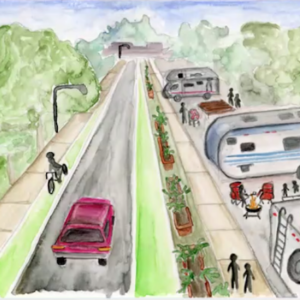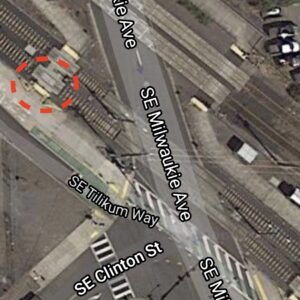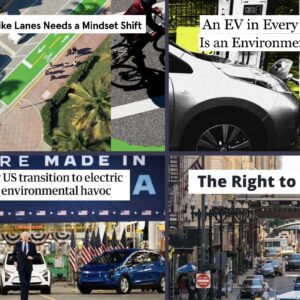“With a very few exceptions, America is no place for cyclists.”
— The Economist
Two news stories involving our big city neighbors to the north, Seattle, are being shared around the web this morning and I think they’re worth your attention (and commentary). The first is about a new tax on car registration to pay for transportation projects and the second is about how Seattle’s lack of Euro-style bikeways is resulting in fatal bicycle collisions.
The Seattle Times reports on the $60 “car-tab fee” being proposed as a bond measure by the City of Seattle. The new fee would look to raise $204 million over 10 years to pay for a wide variety of transportation projects — from basic road repairs and maintenance to transit and bicycle-centric projects.
Seattle’s effort to enact a fee to pay for transportation projects reminds me of Portland’s Safe Sound & Green Street effort back in 2008. That massive effort that was spear-headed by then Commissioner of Transportation now Mayor Sam Adams. Adams wanted to raise $464 million to pay for much-needed road maintenance, bikeways, and other projects by enacting a tax on households and businesses (not a car-based fee). Unfortunately, the effort became highly politicized (Adams was in a race for Mayor at the time) and Adams ultimately shelved the plan.
Seattle is also making international news this morning. A short article in The Economist uses a recent fatal collision as an example of why America lags behind Europe in bike safety. The example is Michael Wang, who died back in July while bicycling in a bike lane.
“With a very few exceptions, America is no place for cyclists,” the story begins. The reporter goes on to cite statistics that show the risk of death while cycling in America is three to five times more likely than it is in Denmark, Germany, or the Netherlands. The solution? More separated and dedicated bicycle infrastructure.
The article mentions Portland as one of only a few American cities that have successfully emulated Europe.
Both of these articles are good food for thought.
My feelings on The Economist piece are that not all bike lanes — or cities where they exist — are created equal. Take my story on Rosa Parks Way for instance. While I might prefer more separation and dedicated space/infrastructure for bicycle traffic, the project is a big improvement. The bike lanes are relatively wide and other changes to the lane configuration contribute to a much safer street. We also have a relatively high awareness of bicycle rights (to coin a Portlandia phrase) in this town, along with a very solid relationship with the Police Bureau to enforce them.
As for the fee proposal, we are still in dire need of a funding source to catch up with maintenance needs and to retrofit our system for the post car-dominant era. However, I’m afraid the current politics in Portland isn’t anywhere near being able to muster a new fee proposal of any kind. With Adams failing to do it the first time around, I doubt he’ll take it up in his remaining time in office. After the 2012 elections, we could have a brand new majority on City Council. Once that happens, maybe a big and bold transportation plan will see its day.





I only glanced through the Economist article, but I would guess that there are far more people driving cars here than there are in Denmark, Germany, or the Netherlands. Wouldn’t that be the biggest factor?
“I would guess that there are far more people driving cars here than there are in Denmark, Germany, or the Netherlands.”
How do you mean? I think the difference you’re pointing to is rather that a smaller PROPORTION of traffic participants are riding bicycles in US cities. The ABSOLUTE number of cars is probably comparable.
I think several people made very eloquent statements yesterday over on the Tennessee Mom get’s a visit from the Police discussion about the cultural differences in Western Europe when it comes to integrating and taking account of bicycles and those one them.
I can’t speak for Germany or Denmark but in the Netherlands it is anywhere from €500 ($720) to €2,000 ($2,800) to get your license. Add a sales tax of buying a car and there are some pretty strong disincentives.
In Groningen for example only 41% of the population owns a car. Amsterdam it is 37%. Major cities of course have lower car ownership whereas in the suburbs it is higher.
And here in Multnomah County the figure is not 100% but closer to 83% of households that own cars.
My vote goes to the candidate with solid cycling and preparedness initiatives (who is not in the pocket of developers).
I lived in Seattle for 11 years and would agree that it is not the most bike friendly location! Seattle, or at least King County, is notorious for slapping extras on their car tabs to cover new projects. I was paying almost $500 a year for tabs on my car in the time that they were trying to get the monorail extended. This project failed of course and all that money that people were paying on their tabs just went to a failed consulting project. Portland however has much lower car tab fees and would be “less” impacted by adding a little extra to cover new projects. I think people are super sensitive to having their property taxes increased around here (reflected in the recently failed school improvement bill) and for some reason that seems to be where the politicians of Multnomah county want to tack everything on. It would be nice to see Portland tax the road users directly instead of taxing home owners if for no other reason than it seems like a more direct correlation.
When I speak to out-of-town cyclists visiting Portland, they generally aren’t all that impressed by Portland’s bike infrastructure. They have some bike infrastructure at home, and they don’t see much here that’s new. Maybe bike routes here have fewer gaps, but its still fundamentally the same.
What does impress them is Portland’s drivers. They speak in awed tones about how Portland drivers know how to behave around cyclists. Its something that, intellectually, they knew could exist somewhere but they never expected to actually see it. It blows their minds.
The whole idea behind Critical Mass is that if you get enough people on bikes then people’s perceptions and behavior will start to change. That’s happening here but not many other places. Infrastructure helped us get here, but there’s so much more to Portland’s success than that.
Well said Steve.
I’d like to hear from some Seattle readers in the know about the chances of the $60 car-tab fee passing. In early August, King County passed a $20 car-tab feel (called a “congestion reduction charge” and confusingly nicknamed the CRC) in order to prevent cutting bus service by 17% (more info: http://bit.ly/mTFB93). That is on top of another $20 fee that took effect in May of this year for street and sidewalk repair. I wouldn’t be surprised if voters decided they had seen enough increases in car-tab fees lately.
Why should the people NOT using the public transportation have to pay for it? Transfer of wealth? Call it what it REALLY is, a TAX.
Why should the people NOT using the public schools have to pay for them? Why should the people NOT using the public libraries have to pay for them? Why should the people NOT using the public parks have to pay for them? Why should the people NOT using public health service have to pay for them? Why should the people NOT using public safety agencies have to pay for them?
Is that really your argument? (and by the way I think you reversed your “call it what it REALLY is” zinger.
nicely done.
Because every person using public transportation or riding a bike or walking is one less person taking up space on your roads. (And they clearly are YOUR roads, right?)
Here in Hillsboro, I have the privilege of paying a monthly $3.10 car tax, $37.20 per year, (they call it a Transportation Utility Fee) and will charge the fee, even if you don’t own a car.
I don’t quite understand your comment about being a ‘car tax.’ The transportation utility fee levied by hillsboro was to fill a gap to free up money from the gas tax to go toward sidewalks, bikepaths, street lighting and sidewalk ramps. So in reality the true ‘gas tax’ is paying for additional infrastructure not only used by motorized vehicles.
Since the TUF (transportation utility fees) are primarily used for street improvements, not sidewalks, bikepaths, street lighting, and sidewalk ramps, it is a car tax.
You can’t just read the FAQ off the website, you actually have to dig into the budgets to find where the money is going.
Doesn’t really make sense to call it a car tax. You can call it a car subsidy. They aren’t taxing cars, they are taxing people. It’s a people tax, being used to subsidize motorized vehicles.
Isn’t it funny that cyclists never want to pay for themselves. Is this because they feel they are “helping out the earth” and so should get a free ride? I would like to see a $60 tab fee on cyclists. I would like to see the traffic laws enforced regarding bicycles. I would like to see bike riders educated about wearing dark colors at night. What cycle fanatics don’t seem to understand is that if you dry up the car traffic in downtown areas the loss of business will kill those areas. I have never seen such an egocentric group so unwilling to pay their own way. They take over the city regularly, are catered to with whole traffic lanes, and yet refuse to buy a licence.
They pay though the cars that we own/drive/rent, through the property tax in the houses that we own or rent, through the food/products that are transported by truck. A $60 fee would be welcomed by myself if it were going to pay for great infrastructure. There are also a high amount of people on bikes that aren’t avid cyclists who are just transporting themselves. After all, before asphalt roads, there were dirt roads, and lots of bikes. We ride on the road because there’s no alternative.
Hey Miles, have a read about who really pays for our roads:
http://www.grist.org/article/2010-09-27-why-an-additional-road-tax-for-bicyclists-would-be-unfair/
http://www.transalt.org/files/newsroom/magazine/032Spring/02provocateur.html
http://www.vtpi.org/whoserd.pdf
That said, it seems pretty obvious that a tax on cars which specifically funds non-car infrastructure is going to get a thumbs down from a lot of car users. It would be politically much smarter to say “this fee will go specifically to these improvements for cars…” And then, over in the budget of property and biz taxes which presently goes to car stuff, move a larger fraction into pedestrian and bike facilities.
Residential property values go up when they have good bike/ped facilities, and cities all over the world are finding that car-free sections are very valuable business assets.
Licensing bikes is just too piddling to be worthwhile. That’s the experience of just about every jurisdiction that’s ever tried it.
I agree with you about educating bike riders, such as I got when I was a tot, and it’s been discussed repeatedly on this blog.
BTW, I’m more “fanatic” about cities and wilderness than I am about bikes, but bikes have their place in both environments.
In 2008 I testified at one of Adam’s meetings against his proposal for a fee on homes and businesses to be dedicated to transportation. But, I said I’d support ANY amount of gas tax increase. Owning a home and owning a car are not causing a failure of the street system. USING the car is causing the need for maintenance and street expansion.
It’s like being at an all-you-can-eat buffet. Adding a dollar to the price of entry (like an annual license fee) doesn’t make you change how much you consume (eat or drive) on a daily basis. Changing the price structure for each piece (gallon of gas or piece of food) will change consumption.
No to annual fee increases. Yes to $5 gas tax.
Very well said. If car owners are going to pay their share of the costs of the transportation system, then gax taxes and tolls must be increased substantially. Perhaps once the autoists demonstrate a willingness to pay their share, then a conversation could be started on how bicyclists would pay their share. As it is, cyclists are already paying a portion of the costs imposed by autoists.
No to additional gas tax.
Yes to Vehicle Mile Tax * Vehicle Weight factor.
Cars are going electric, a fuel tax doesn’t take that into account.
A gas tax is actually pretty equivalent to a mileage tax with a weight factor, especially when you decide you need a carbon tax (like in B.C.), too. Plus, a gasoline tax is really inexpensive to administer since it’s done at the wholesale distributor level. To administer a weight mile tax, it gets really complicated and every car would need a gps system, whlch costs hundreds of dollars, and there would need to be ways to get money from out-of-state cars, etc. The administrative costs of a weight-mile system are millions of dollars.
You’ll also find that the fleet mileage today is just about what it was in 1980! So, high-mileage cars are not really causing much revenue loss yet.
As for electric cars, they don’t pay a mileage tax or gas tax, but we (residents of Oregon) reward them with a $1500 income tax credit. Take that away and it would be the equivalent of a gas tax for about 20 years.
This topic seems to have generated more than the usual troll traffic.
The car tab will probably pass here; we’ve been hamstrung for more than a decade by an anti-government activist who proposed a $30 car tab initiative. $30 car tabs became a mantra and everytime one of this joker’s initiatives gets overturned in the courts the legislature and government, afraid of a backlash enact it anyway.
but Seattle is a pretty big city with real transit needs and funding crippled by the general economic downturn and the people know it
I oversimplify a bit.
The mayor was pushing for an $80 fee, but that was too much for the city counsel to swallow – even though transit and roads people say that’s about the amount that would make things work.
As for the economist article, the street where the recent fatal hit and run occurred (Dexter Ave N) is one of the most-biked streets in Seattle the writer is just affirming the consequent, and it’s crap. Even buffered or separated bike facilities have crossings with other roadways and if a driver is predisposed to cross a bike lane without regard to whether a cyclist is in it – they’re not going to be any less so about crossing a separated facility.
The SUV had a stop sign; stopped, and then went – right through the passing cyclist. To my mind buffered and separated facilities tend to make it more difficult to see cyclists – all well and good on the straightaways, but much much worse at the crossings.
The problem is rarely lack of facilities, it’s usually the attitudes and proclivities of the vehicle operators (both motorized and non-motorized) (though in this case – it was entirely the motorist’s fault)
Oh, and part of the reason the $30 car tab thing got such traction was that at the time OR had $25 tabs regardless of the value of the vehicle…
Why are there no bicycle registration fees? Or required certified training courses? I get the reduction in traffic and emissions but I never understood why cyclists don’t pay a little for these projects. (to say cyclists have cars is not an answer. if a family has two cars they have to register both)
Guess I should have read the posts above, but I do think it would be worth registering bikes and putting the fees collected on a licensing/training program.
the fee would have to be pretty high just to pay for administration of the registration program itself
car tabs are a backward way of funding that charge all cars and motorcycles the same even though the amount they are used and the damage they cause vary widely. We should be moving to usage based fees like a vehicle miles traveled tax based on weight rather than a one size fits all license plate fee that in many ways encourages people to drive more once they have invested in the expensive tab fee.
I think all mv taxation should include the intent to discourage mv ownership and use, not just raise revenue. Hence my idea to completely remove free on-street parking. Institute a $60/year pass, and bing, there’s your revenue stream. There are lots of way for JulieCitizen ofSeattle to avoid paying it, including clearing the things out of the driveway, and placing the mv there.
Retrofit the system – I’m all for it, but which user group to fund it and how, not sure yet. Not property taxes, no matter the cute, green slogan. The more folks not using somv, the more obvious it will become that we need to fund public transit. Thanks for the article !
“the post car-dominant era”
This has nothing to do with the article, but that phrase leaves me salivating.
Here is what really bugs me:
– In 2007 the car industry spend 63 Billion on advertisement (hmmm brainwashing!)
– In the 1920-30 car companies systematically destroyed most of the functioning metro transportation systems.
So why don’t we go for the deepest and most ruthless pockets? We bailed them out… might be time that the General Motors etc gave back!
So they want cars to pay for bike improvements? That dosent sound fair. What if they taxed bikes to pay for all day kindergarden?
Your concern would have some validity if cars paid the full cost of car improvements. But, in fact they don’t. The gas tax would have to be as much as $3.50 per gallon to cover the costs imposed by motor vehicles. So, when motorists start paying their share, then perhaps there can be a fruitful conversation about alternatives for paying for bike improvements.